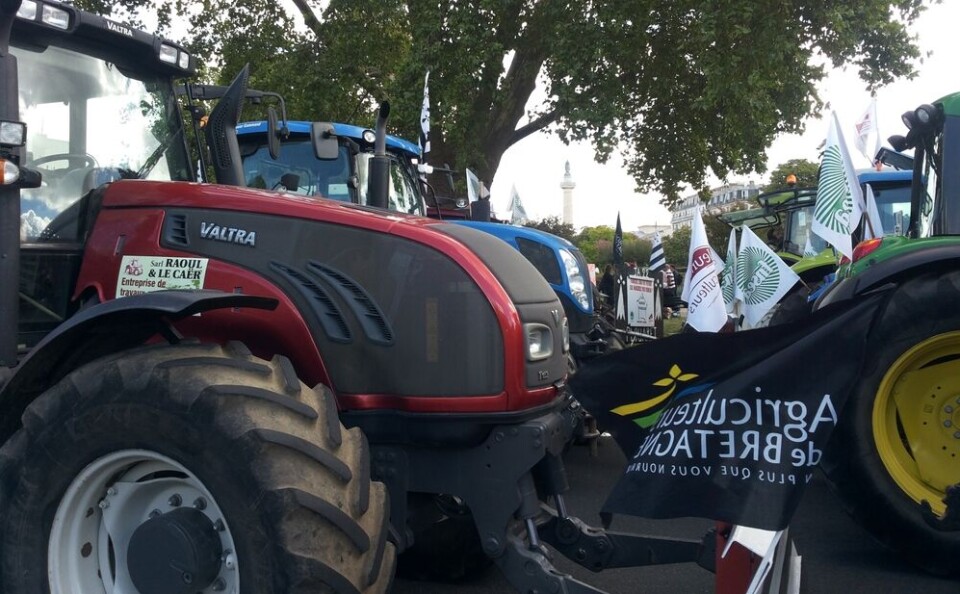-
Hosting scheme in south-west France lets newcomers sample lifestyle
Households in nine Dordogne communes volunteer under Mes Nouveaux Voisins scheme
-
French boulangeries demand right for staff to work on May 1 so they can open
Artisan bakery owners can work but employees cannot, while certain industrial bakeries are allowed to remain open with workers
-
How many Americans live in Paris - and where else are they choosing in France?
Over a quarter of all US nationals in France live in the capital city
Farmers block several French motorways as protests spread
‘All departments’ are now concerned by the protest over regulations

Farmers in the south-west have been blocking the A64 motorway for four days. With no resolution in sight, the president of the leading farmers’ union called for action to spread to “all departments” and to last “as long as is needed.”
In response to his call, farmers started to block more motorways on January 22, with more action planned over the coming days.
So far the affected motorways are:
- The A64 near Carbone (Haute-Garonne)
- The A680 near Verfeil (Haute-Garonne)
- The A9 near Perpignan (Pyrénées-Orientales)
- The A68 near Albi (Tarn), announced from January 23
11h50 ⚠️ : sur #A9, ⛔ autoroute coupée en direction de l’Espagne après l'entrée n° 41 Perpignan-Nord. ➡️ Sortie obligatoire. Perpignan Nord n°41 Écoutez @Radio1077 #InfoTrafic
— Autoroute A9 (@A9Trafic) January 22, 2024
Why are the farmers protesting?
The FNSEA and Jeunes Agriculteurs farmers’ unions are protesting the multiplication of European regulations, delays in the payment of government subsidies and the ban on certain common pesticides.
Prime minister Gabriel Attal is expected to meet with the unions this week in an attempt to defuse the situation.
However, Arnaud Rousseau, the president of the FNSEA farmers’ union has taken a combative stance before the meeting, calling for more action “in all departments”.
"I can tell you that from today and all week and for as long as is needed, we will be taking a certain number of actions,” he told France Inter on January 22.
The A64 blocked for four days
Attempts by the local prefect and the government to defuse the protest have so far proved fruitless, and the roadblock on the A64 between Toulouse and Bayonne at Carbone (Haute Garonne) is now well implanted.
Les agriculteurs continuent de bloquer l’A64 pour la 4eme journée consécutive à Carbonne. pic.twitter.com/NA8lTjRAfK
— Réalité Actuelle (@ReaActuelle) January 21, 2024
Farmers have parked tractors, built barriers of straw and taken to camping on the motorway. On Sunday night they even threw a protest party.
Le blocage de l'A64 se poursuit en musique à Carbonne 🧑🌾#AgriculteursEnColere #agriculteurs pic.twitter.com/rIn4BJrBkD
— Anonyme Citoyen (@AnonymeCitoyen) January 21, 2024
‘No immediate solution’
A new law intended to appease the farmers’ unions was scheduled in parliament for January 24, however, this has been postponed.
“The law should have been presented this week. But to add several more measures - there are some subjects that we need to add - we will need a few more weeks,” said Minister of Agriculture, Marc Fesneau, who says he is “on the side of the farmers”.
The prefect of Haute-Garonne, Pierre-André Durand, met with the farmers at the roadblock on Saturday (January 20).
“I have made it very clear that we are open to discussion,” he said. “Taking into account the complexity of many parts of the situation, we cannot provide an immediate solution,” he told BFMTV.
However, they insist that their protest will continue until the government offers clear solutions.
“We don’t want to hear ‘wait and see, we’ll give you a date for answers in February,’” Jérôme Bayle, a cattle farmer from Haute Garonne told BFMTV.
“So long as we don’t have any concrete answers, and the prime minister coming to us with a real offer, we will not move.”
While so far the protest has been limited to Occitanie, some farmers made it clear that they would heed the union’s call to go further.
“If we have to go to Paris, then we will go to Paris,” they told BFMTV.
‘It’s a shame we have reached this point’
However, the president of the Jeunes Agriculteurs, Arnaud Gaillot, presented a more apologetic, less militant message.
“I don’t think we will be gilets jaunes” he told BFMTV. “The aim is not to make a mess of the whole country”.
“It’s a shame we have reached this point - it is hard to make your voice heard in this country”.
The spectre of a farmers’ roadblock in Paris is a major challenge for the new government of Prime Minister Gabriel Attal. On February 8, 2023, 2,000 farmers and 500 tractors caused gridlock in Paris, with 365 km of traffic jams reported.
In addition, the politically sensitive Paris International Agricultural Show runs from February 24 to March 3.
The prime minister will want to find a solution before the event, which sees thousands of farmers visit the capital, and in favourable conditions can offer an easy way for politicians to burnish their image and show their affection for regional produce.
Read also
Why French village and town road signs are being turned upside down
‘Cut your cow numbers to help meet climate commitments’, France told
























